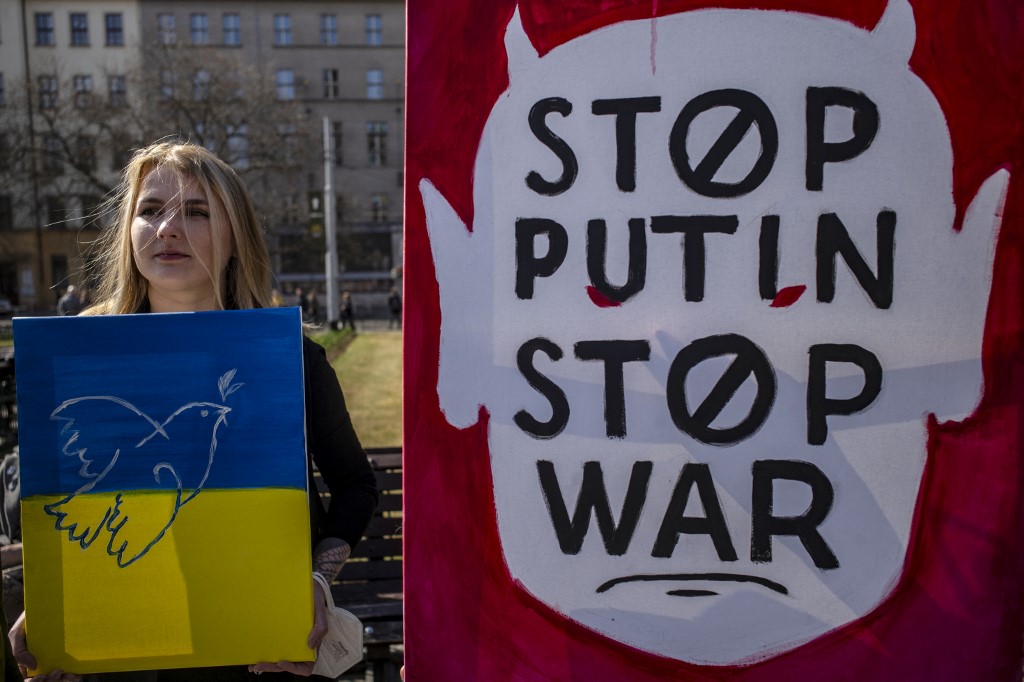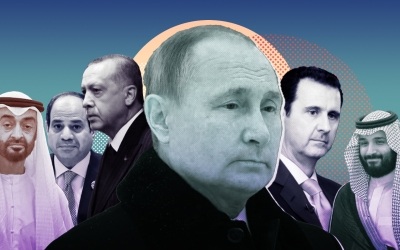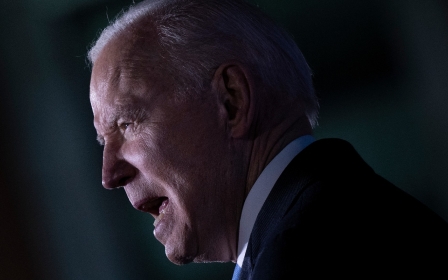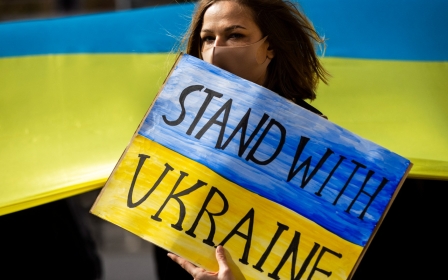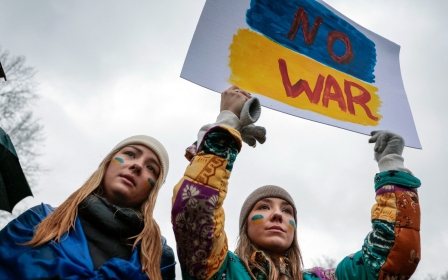Russia-Ukraine war: US can no longer negotiate, let alone lead
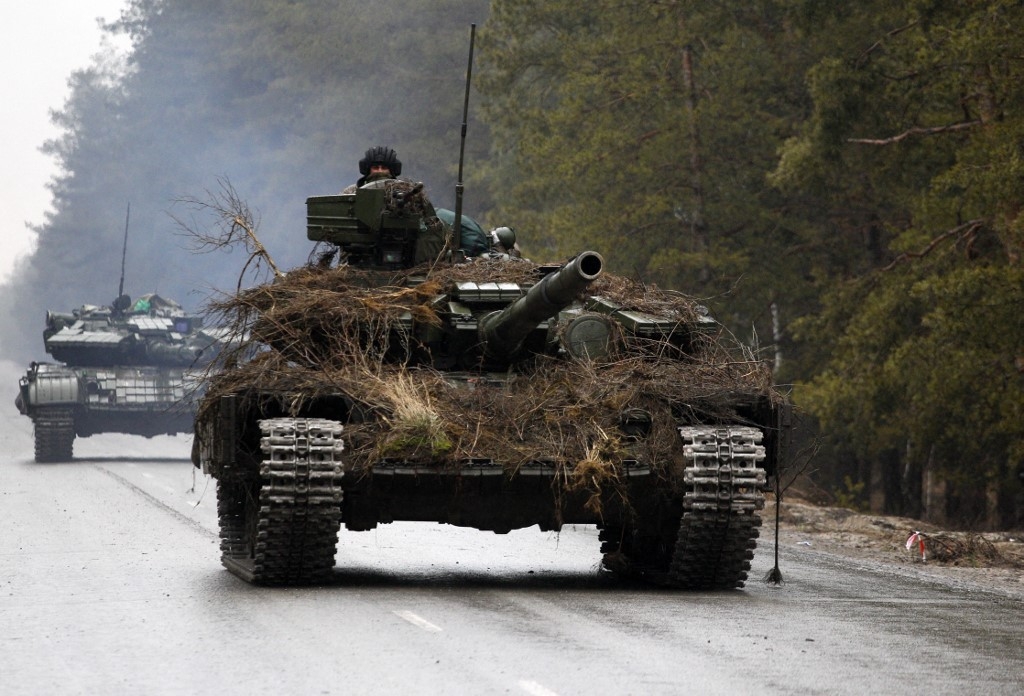
One of the more bizarre public encounters at the Doha Forum, an annual gathering of Middle Eastern movers and shakers held in Doha this weekend, took place between Turkish Foreign Minister Mevlut Cavusoglu and a reporter for CNBC.
Reporter Hadley Gamble battered the foreign minister with a series of questions on Turkey’s commitment to Nato, its purchase of S-400 missile defence systems, its refusal to sanction Russia, its reception of oligarchs linked to the Kremlin, and how Turkey can be considered seriously as a foreign power if its lira is so flakey.
Western capitals have abandoned their roles as peacekeepers in the very arena where they are most needed
Just two days after Gamble’s gambit, Turkey hosted talks in Istanbul, which secured the biggest Kremlin climb-down since the start of the war; an oligarch with connections to the Kremlin, Roman Abramovich, was revealed to have been a target of suspected poisoning; and Turkey emerged as the one country in the region that can maintain credible dialogue with both sides.
Far from being a subject of investigation, Abramovich played a crucial role in getting the two sides together in Istanbul, which was why he sat with Turkish officials in the negotiating session, Turkish officials tell me.
Contrast that with the US position, or indeed that of any major European power. Berlin, Paris and London have each hosted conferences to end conflicts stretching from the Balkans to Afghanistan. But not this time, and not for a conflict we are constantly told is on Europe’s doorstep. How is this so?
New MEE newsletter: Jerusalem Dispatch
Sign up to get the latest insights and analysis on Israel-Palestine, alongside Turkey Unpacked and other MEE newsletters
From the US, only belligerence emerges. Republican Senator Lindsey Graham has repeatedly called for regime change in Russia, and the White House recently had to condemn his call for the assassination of President Vladimir Putin.
But more than one eyebrow was raised at the Doha conference when US President Joe Biden made similar comments in Poland this weekend - remarks that similarly had to be quickly walked back by his overworked staffers and the president himself.
Stoked by nationalists
No Ukrainian can accuse Turkey of siding with Putin. Turkey has accepted 58,000 refugees, more than double the number accepted by the much more outspoken and horrified UK.
From the southern shores of the Black Sea, Turkey is heavily invested in maintaining the status quo on the northern shores. Ankara has arguably done as much with its drones to provide Ukraine with the necessary tools to fight the Russian invasion as the UK has done with its anti-tank weapons. And yet, that did not prevent Turkish presidential adviser Ibrahim Kalin from pointing out in Doha that Russia’s invasion was provoked.
Ukrainian President Volodymyr Zelensky’s concessions - on neutrality, the status of Donbas, and a potential shift in the borders of Ukraine - indicate that Putin will not return empty-handed from this disastrous venture, whatever happens next.
How much better off would Ukraine be if Kyiv had honoured the terms of an international agreement, the Minsk accord, signed by a previous Ukrainian president? All it had to do then was recognise Donbas as an autonomous region; now it must recognise its independence.
This clash has been stoked by nationalists of both Ukrainian and Russian hue, with cataclysmic consequences for Ukrainians and Russians alike. But neither Washington, nor any European capital, is in a position to persuade the Russian nationalist in the Kremlin to climb down - because London, Paris, Berlin and Warsaw are belligerents to the conflict, as much as Moscow and Kyiv are.
This is not what happened during the wars that erupted when Yugoslavia broke up, when they still had the power to mediate. Western capitals have abandoned their roles as peacekeepers in the very arena where they are most needed.
Good guys and bad guys
Instead, this conflict is being painted in its starkest Manichean terms. It is democracy and sovereignty against autocracy and empire; in Graham’s terms, the good guys versus the bad. These are the fantasies of a western empire in decay, and this approach will not bring an end to this conflict.
For that script, you have to go back 30 years, when conflicts like these were breaking out all around former Soviet territory. Look today at the battlefields of the 1990s: Nagorno-Karabakh, Georgia, Transnistria - all are “frozen conflicts”, so-called because rival claims over land, language and identity have never been solved.
The one exception is Chechnya - and we all know what happened there. When by 2003, Putin had crushed Chechen resistance with the loss of tens of thousands of lives, doing to Grozny what he has done to Mariupol, he received a royal welcome in London. He was rewarded by then-Prime Minister Tony Blair with the signing of a contract between BP and TNK, the very deal that BP has now abandoned over Ukraine.
If Putin’s invasion follows the pattern of past post-Soviet conflicts, at some point, the fighting will stop around frontiers that will not be the same as the ones his tanks rolled over on 24 February.
Ukraine will have secured its entry to the EU at huge cost. The cause of democracy in Russia itself will have received a huge setback. The one way of dooming democrats in Russia is to call for regime change in the Kremlin.
Dismal precedents
The surest way of making life difficult for a Russia frozen out of the western banking system would be for the US Treasury to lift sanctions on Iran’s Revolutionary Guards, because it would mean that Iran’s largest unsanctioned trading entities could not trade with Russia’s sanctioned companies.
Even if Biden lifts the foreign terrorist designation from the Revolutionary Guards, and there are signs that this may be about to happen in exchange for a return to the Iran nuclear deal, the US Treasury will never lift its sanctions on the organisation.
This issue in itself epitomises the cleft stick into which western foreign policy has degenerated. It can no longer force compliance, and yet it still uses the language of force: war and sanctions. It craves to lead, and can no longer do so.
What is already clear is that the US and Europe have forfeited the right to negotiate an end to the Ukraine conflict
In order to hit one adversary with sanctions, it must lift sanctions on another; maximum pressure rebounds like a boomerang. It screams and shouts about Russian shelling of tower blocks in Kharkiv and Kyiv, but maintains a grim silence when Israeli jets do the same to tower blocks in Gaza.
At few other points in modern history has the gap between reality and rhetoric been as large - 1914 or 1939, perhaps, but those are not happy precedents.
Let’s take Gamble’s thesis that you cannot project a strong foreign policy if there is turmoil at home. Only this time, let’s not project at Turkey, but turn it on ourselves at home.
In the US, Fox News has been seriously running a campaign that the US is about to run out of food. The United States of America is united no more. It is dangerously polarised, far beyond the usual limits of political discourse.
In Europe, the populist right are rising as a force. In Italy, a radical right populist Eurosceptic party, the Fratelli d’Italia, could score significantly in the next elections. In France, President Emmanuel Macron is expected to stay in power, but the presidential campaign has been a race to the bottom of far-right politics, with candidates fighting over who can appear more anti-Muslim. In the UK, Prime Minister Boris Johnson, a proven liar, is hanging on to his office only because there is a war in Ukraine.
Looming crisis
Is this all coincidence? In each country, the left is crushed and unwilling or unable to stand up for the rights of workers, fair wages and social protections; and in each, the populist right is on the move and able to establish credible international links.
At the very point when the West conceives of itself as the lone standard bearer of democracy and liberalism, illiberalism at home is running amok. And all of this is before Western Europe feels the blowback from the “crippling” sanctions it has imposed on Russia.
If Putin decides tomorrow to cut off the gas that he continues to supply through Ukraine to Europe, on the pretext that he is not being paid in rubles as he demands, there would be a crisis.
The US has said it would strive to add 15 billion cubic metres of liquefied natural gas to the EU this year, which could be achieved by redirecting LNG shipments from other countries. The US simply said it would work with “international partners”, without specifying where the extra LNG would come from. But even that is a 10th of the 155 billion cubic metres a year of gas Russia exports to the EU.
Would Putin - branded a demon, a second Hitler - be inclined to make Europe’s life easier by waiting for it to wean itself off a dependency on Russian exports?
The exposure of Europe and the US to inflation and recession is nothing when compared to Egypt’s or indeed Turkey’s, so the sense of trepidation felt at the Doha Forum over the war in Ukraine, and what it could be about to tip us all into, is real.
What is already clear is that the US and Europe have forfeited the right to negotiate an end to the Ukraine conflict. In such circumstances, it is probably best not to sneer at Turkey’s mediation attempts, because right now it’s the only game in town.
The views expressed in this article belong to the author and do not necessarily reflect the editorial policy of Middle East Eye.
This article is available in French on Middle East Eye French edition.
Middle East Eye delivers independent and unrivalled coverage and analysis of the Middle East, North Africa and beyond. To learn more about republishing this content and the associated fees, please fill out this form. More about MEE can be found here.



